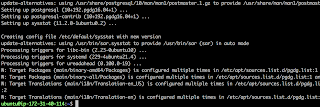Please find steps for installing SonarQube on Ubuntu EC2. Make sure port 9000 is opened in security group(firewall rule).
SonarQube is java based tool along with back end - back end can be MySQL, Oracle or PostgreSQL. We will use Postgres for set up on Ubuntu.
Let us start with java install (skip java install if you already have it installed)
1. Java steps
sudo apt-get update
sudo apt-get install default-jdk -y
Verify Java Version
java -version
OpenJDK Runtime Environment (build 1.8.0_191-8u191-b12-2ubuntu0.16.04.1-b12)
OpenJDK 64-Bit Server VM (build 25.191-b12, mixed mode)
2. Postgres Installation
1. sudo sh -c 'echo "deb http://apt.postgresql.org/pub/
2. sudo wget -q https://www.postgresql.org/med
3. sudo apt-get -y install postgresql postgresql-contrib

4. sudo systemctl start postgresql
5. sudo systemctl enable postgresql
Login as postgres user now
7. sudo su - postgres
8. Now create a user below
7. sudo su - postgres
8. Now create a user below
3. Now install SonarQube Web App
sudo wget https://binaries.sonarsource.com/Distribution/sonarqube/sonarqube-6.4.zip
sudo apt-get -y install unzip
sudo unzip sonarqube-6.4.zip -d /opt
sudo mv /opt/sonarqube-6.4 /opt/sonarqube -v
Modify sonar.properties file
sudo vi /opt/sonarqube/conf/sonar.prop
uncomment the below lines by removing # and add values highlighted yellow
sonar.jdbc.username=sonar
sonar.jdbc.password=password
Next, uncomment the below line, removing #
sonar.jdbc.url=jdbc:postgresql
Press escape, and enter :wq! to come out of the above screen.
Create Sonar as a service
Execute the below command:
sudo vi /etc/systemd/system/sonar.serv
add the below code in green color:
[Unit]
Description=SonarQube service
After=syslog.target network.target
[Service]
Type=forking
ExecStart=/opt/sonarqube/bin/l
ExecStop=/opt/sonarqube/bin/li
User=root
Group=root
Restart=always
[Install]
WantedBy=multi-user.target
sudo systemctl enable sonar
sudo systemctl start sonar
sudo systemctl status sonar
type q now to come out of this mode.
Now execute the below command to see if Sonarqube is up and running. This may take a few minutes.
tail -f /opt/sonarqube/logs/sonar.log
Make sure you get the below message that says sonarqube is up..
sudo systemctl start sonar
sudo systemctl status sonar
type q now to come out of this mode.
Now execute the below command to see if Sonarqube is up and running. This may take a few minutes.
tail -f /opt/sonarqube/logs/sonar.log
Make sure you get the below message that says sonarqube is up..
Now access sonarQube UI by going to browser and enter public dns name with port 9000
Now to go to browser --> http://your_SonarQube_publicdns_name:9000
Click here to learn how to integrate SonarQube with Jenkins.
Please watch above steps in myYouTube video as well:












esfrdrtttftf
ReplyDeleteHi DevOps Coach, thanks for nice tutorials on this 👍 can you provide us some leads how we can achieve this jenkins to sonarqube integration with actually installing sonarqube plugin and making rest api calls to sonarqube. if you got some sample script of achieving this way, please share it with me.
ReplyDeleteHi Sir
ReplyDeleteI am getting unable to create java virtual machine error after while starting the sonar quebe.
Kindly help me Sir
Excellent tutorial!!
ReplyDeleteCan you please explain steps to do setup on Windows Machine also ?
ReplyDelete